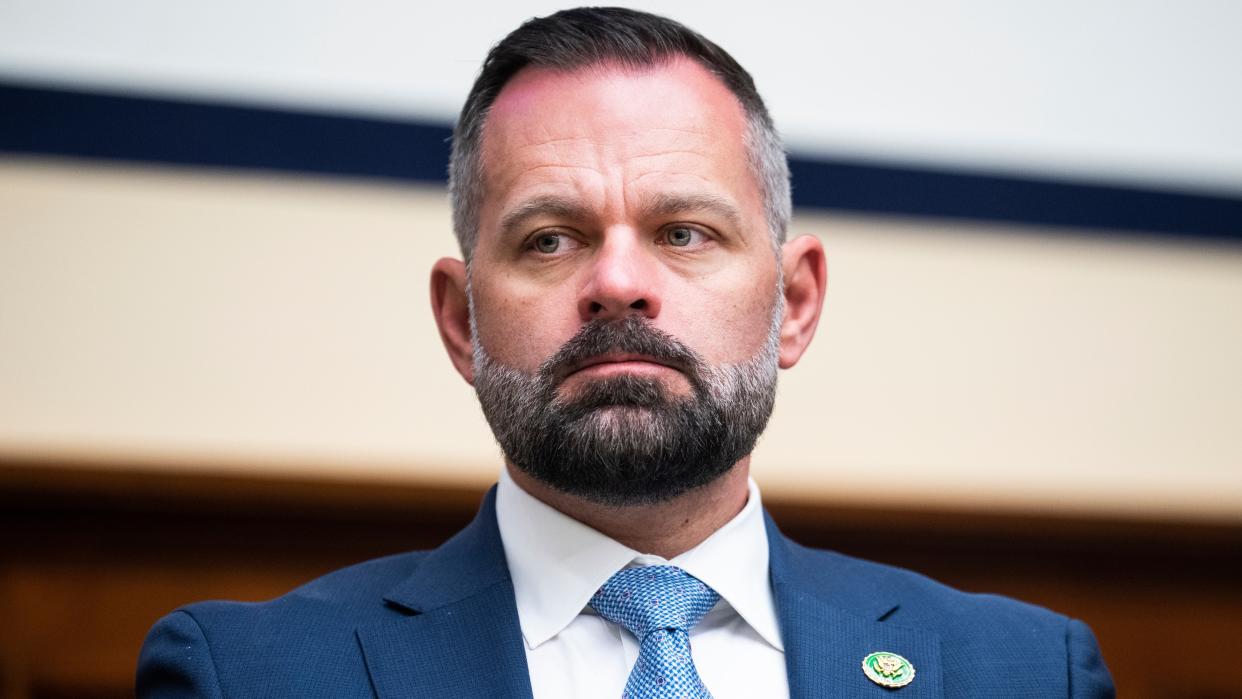We’ve got a sibling Special Election showdown in Senate District 15.
After the tragic passing of Sen. Geraldine Thompson last month, rumors began to swirl that Democratic Rep. LaVon Bracy Davis was Thompson’s preferred successor to carry on her legacy.
Bracy Davis this week confirmed her entry into the as-yet-unscheduled Special Election contest, making her announcement alongside Thompson’s daughter and niece.
But here’s something you don’t see every day: Bracy Davis’ brother, former Sen. Randolph Bracy, has also filed for the contest after unsuccessfully challenging Thompson in a Democratic Primary last cycle.
That means the brother-sister duo will be battling against each other, and possibly more candidates, in an August 2026 Primary.
Bracy Davis, for her part, is downplaying the family feud aspect of this contest.
“I love my brother and I wish him well,” Bracy Davis said. “I’m not running against anyone. I am running eventually for the people of Senate District 15.”
Bracy, however, had no such reservations.
“This is a sad day for the Bracy name,” he said. “My sister choosing to run against me dishonors our father’s legacy in every way possible. … I will not disparage our Father; who believed in this family, by debating my sister in any format.”
This isn’t the first evidence of a sibling rivalry. Bracy Davis endorsed Thompson as she defended her seat against former Sen. Bracy last cycle. But rarely do we see these types of battle bleed over onto the ballot.
Now, it’s onto our weekly game of winners and losers.
Winners
Honorable mention: Byron Donalds. We’ve spotlighted Donalds here plenty in recent weeks due to the major momentum he’s accumulated in the 2026 Governor’s race. And that continued this week.
Among the new names supporting Donalds in the nascent contest are U.S. Sen. Rick Scott, U.S. Rep. Vern Buchanan and the Miami Young Republicans.
Scott’s support is no surprise. He and Gov. Ron DeSantis have had a famously frosty relationship for years. So it’s not shocking Scott went ahead and backed Donalds before First Lady Casey DeSantis made a decision on whether to run and continue the DeSantis legacy.
Buchanan’s decision to endorse early was more notable. But like Scott, he backed Donald Trump in the 2024 Presidential Primary over DeSantis.
Aside from Trump’s backing, which Donalds earned earlier this year, any one of these endorsements isn’t going to tilt the scale. But every time a significant name backs Donalds early, it’s just another sign that the party is falling behind him in the coming contest. And it makes it more daunting for the First Lady to mount a challenge.
Will she decide to run anyway, with the hope that her husband’s cache at home can overtake the Trump machine? We’ll see.
Almost (but not quite) the biggest winner: Florida Dems. Look, we’ve been here before. But yet again, Florida Democrats are talking a big game about their chances in two seemingly unwinnable races. And they have the money to back up those claims.
This week saw fundraising reports coming for the Special Elections in Florida’s 1st and 6th Congressional Districts. In CD 1, Democrat Gay Valimont more than tripled Chief Financial Officer Jimmy Patronis’ contributions, $6.5 million to $2.1 million. As of March 12, the close of the latest reporting period, she held $2.1 million to Patronis’ $815,000.
That gap was even more stark in CD 6, where Democrat Josh Weil outraised state Sen. Randy Fine just under $10 million to less than $1 million. Weil held $1.3 million as of March 12, while Fine retained only $93,000.
That’s a ton of money, but a good bulk of it is from out-of-state Democrats angry with the Trump administration and looking to lash out by flipping red districts and possibly handing control of the House back to Democrats.
But when you look at the voting registration numbers, things look grim for Democrats. There are nearly twice as many registered Republicans in CD 6 than there are Democrats. In CD 1, the GOP has more than 2.5 times as many voters available to vote in the April 1 General Election.
Voters, not dollars, cast ballots. And unless Democrats think this flood of cash is going to win over a huge bulk of the registered Republicans in these districts, this money may as well be flushed down the drain.
Crazy things happen in politics. We aren’t going to say there’s zero shot to win these races, but it’s close. And whatever you think Democrats’ chances are, they certainly don’t warrant this flood of dollars that could be saved for actually competitive races.
But the Democratic National Committee is getting on the hype train, promising support for these contests (though notably, the DNC didn’t put a dollar amount on that support).
Again, we’ve been here before. Democrats promise big things, then come up empty (see, basically, the entire 2024 General Election map). If these huge sums of money get wasted yet again, the rest of the country really needs to try to come to grips with the fact that Florida is a red state, and their green should go elsewhere.
But for now, Democrats have hope that they really can pull off this miracle. If they fail yet again, you can be sure we’ll be discussing it here again in a few weeks.
The biggest winner: Ben Albritton. Albritton earned well-deserved honors this week during Rural Counties Day at the Capitol.
The Rural Counties Day Planning Committee granted Albritton its first-ever Bobby Payne Florida Rural Counties Advocacy Award, praising the experienced citrus grower for his advocacy in Tallahassee.
“Throughout his years in office, he has consistently stood up for rural communities, but his actions as Senate President have shown what a true champion he is for our counties,” said Rural Counties Day Planning Committee member Darryl Register, the Executive Director of the Baker County Chamber of Commerce.
“He has made addressing the needs of rural Florida a top priority of his presidency and done so in a thoughtful manner that provides us with the support we need to thrive in ways that also preserve what makes our communities special. President Albritton’s actions have proven he is more than deserving of this award.”
Albritton, now Senate President, certainly has bigger goals during his two-year reign than receiving awards. But there’s no doubt that the fourth-generation farmer appreciated the recognition this week from his community.
And one of those big goals is Albritton’s “Rural Renaissance” package. And there was good news on that front too, with a bill carried by Tallahassee Republican Sen. Corey Simon (SB 110) garnering unanimous approval Wednesday on the Senate floor.
That measure still needs to move through the House, but something tells us Albritton will be able to celebrate passage of that bill soon, adding another accomplishment to his tenure.
Losers
Dishonorable mention: University of South Florida. USF has a DEI problem, with diversity, equity and inclusion policies getting the university into double trouble in recent days.
This past week, a USF doctor was forced to resign after leaked audio saw him bragging about skirting anti-DEI rules in Florida.
Haywood Brown previously served as USF’s Vice President for Institutional Equity. But as the state pushed for educational institutions to end DEI programs, Brown transitioned to become the Associate Vice President of Academic Affairs/
“Even though I eliminated my title, I didn’t eliminate my job,” Haywood said on audio reported by Fox News Digital. “That didn’t change anything that I was doing already.”
He went on to mention his actions were “slippery.” Once word got out, Brown was out of a job.
That gave USF a bad look just days after it was reported that the Trump administration had put USF in its crosshairs as part of an investigation of universities throughout the country.
Apparently at issue is USF’s McKnight Doctoral Fellowship Program, which aims to boost Black and Hispanic faculty hiring. USF says Florida law still permits this scholarship, but the U.S. Department of Education disagrees.
And these are precisely the types of fights we expect to see over the next few years, as the Trump administration seeks to flex its power and intimidate institutions to change. Perhaps USF’s best bet is that Trump winds down the Department so fast that it can’t effectively enforce this probe.
Almost (but not quite) the biggest loser: Miami-Dade County. Are dark days on the horizon for Florida’s most populous county?
Reports emerged this week that Mayor Daniella Levine Cava wrote to government leaders that spending cuts are coming. Revenues are down after an influx of federal cash during the COVID years. And Levine Cava said new spending was required to accommodate newly empowered positions in local government, such as the Sheriff’s Office and Tax Collector.
Levine Cava also mounted a spending surge during her first term in office. The Democrat pushed for a more robust government before cruising to re-election last Summer, cutting against the trend of GOP success across the state, and particularly in Miami-Dade.
But she appears to see the writing on the wall and says work will need to be done to make up revenue shortfalls in the near future.
Pair that with a report that more people are leaving Miami-Dade County on net than any county in Florida, and one wonders what the next few years are going to look like in the home of the 305.
The biggest loser: Fort Myers City Council. Wherever you fall in the discussion of whether a local government should be forced to cooperate with federal immigration efforts, one thing that is crystal clear is that the Fort Myers government played out this debate this week about as poorly as a municipality could.
First, the Council deadlocked 3-3 Monday, with one member absent, when deciding whether to approve a deal to cooperate with Immigration and Customs Enforcement. That tie killed the deal, and a shitstorm followed.
Florida Attorney General James Uthmeier threatened Council members who opposed the deal with being removed from office by DeSantis. Facing criticism, Council members rushed to reconsider the vote by the end of the week.
And at the end of it, with multiple members flipping their votes, the Council overwhelmingly approved the arrangement.
We’ve been critical of DeSantis’ heavy-handed approach in suspending officials, though he’s arguably on firmer ground here than in the past given that the Legislature recently approved a law banning sanctuary cities.
And there’s a legitimate argument that if the feds want to deport people, they should provide the manpower to do it. That will likely end up in court and we’ll see where the legal landscape lands when that’s all said and done.
But put simply: Either localities want to fight what they see as overreach and take on whatever slings and arrows they get while doing so, or they see the writing on the wall and go along to avoid any conflict.
Fort Myers officials essentially picked the worst of both options, getting lambasted by critics for a week, opening themselves up to removal, and then backing down anyway.
Why go through the charade in the first place then?
City Council member Darla Bonk put the onus squarely on City Attorney Grant Alley. Bonk said Alley failed to properly inform Council members that not immediately approving the ICE arrangement would make them a de facto sanctuary city and open them up to the Governor’s wrath.
Sorry, have you now watched the news for the last six to 10 years? DeSantis and Trump have been on a warpath about this issue. Such a high-profile rebuke was not going to go unnoticed.
So what we have at the end of it is: hardcore conservatives are unhappy even with the final agreement, because it looked like several of these Council members had to be bullied to, in conservatives’ eyes, do the right thing.
And those who wouldn’t even think twice about going along with these raids are also furious given the eventual capitulation.
Perhaps by voting for this arrangement, these Council members saved themselves from the Governor removing them from office. But it wouldn’t be surprising if some of them lost their jobs anyway based on the outrage they just courted from their community.
Post Views: 0

 Entertainment8 years ago
Entertainment8 years ago
 Politics8 years ago
Politics8 years ago
 Entertainment8 years ago
Entertainment8 years ago
 Entertainment8 years ago
Entertainment8 years ago
 Tech8 years ago
Tech8 years ago
 Tech8 years ago
Tech8 years ago
 Politics8 years ago
Politics8 years ago
 Tech8 years ago
Tech8 years ago












